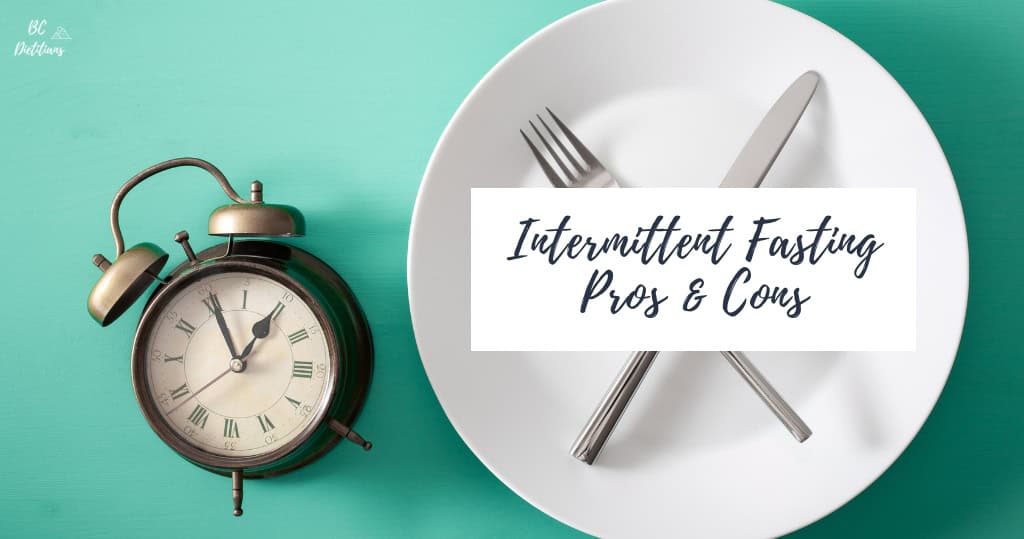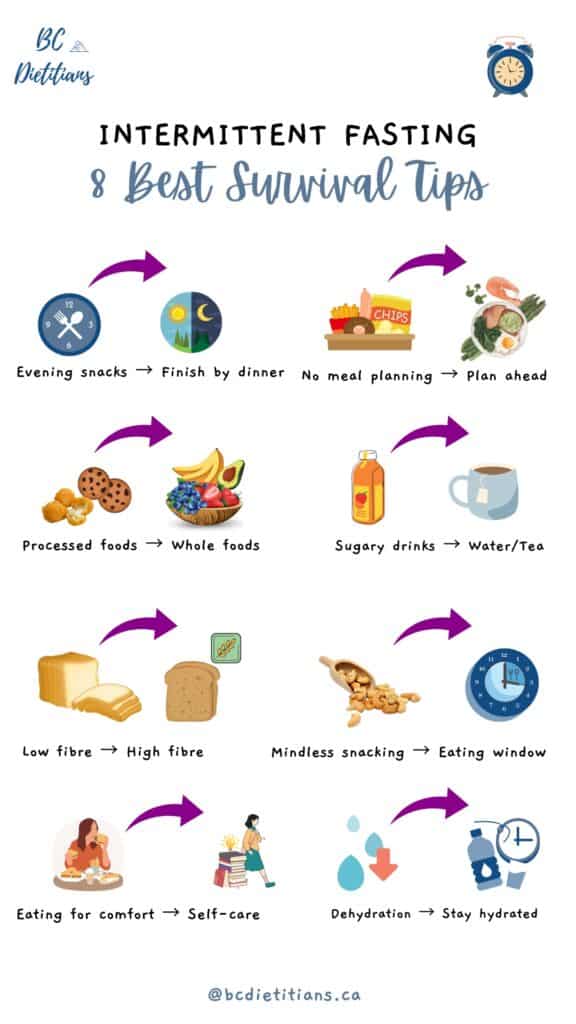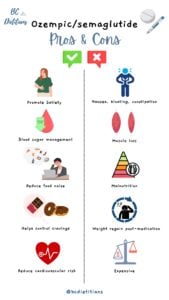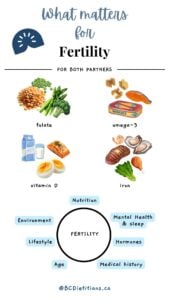Intermittent fasting (IF) has become an increasingly popular diet and is not going away any time soon. People mainly use this diet as a tool for weight loss but others use it for a wide range of other reasons too including to reduce inflammation, improve digestion, stabilize blood sugar, and increase longevity.
Anytime when a diet is touted as a “cure-all”, you have to proceed with caution. In this article, we will look at if there is any research in supporting these claims and determine whether IF is worth the hype.
P.S. if you’re done with being on another diet to lose weight, check out our blog post on How You Can Actually Lose Weight Without Another Diet.
What is intermittent fasting?
Intermittent Fasting is define as “alternating periods of eating with periods of fasting, typically a minimum of 12 h” and this is one of the main reasons why IF is so popular.
The diet is simple – it mainly focus on what time to eat (and not eat) vs. what we eat.
Proponents of IF claims that one of the main benefits of IF is metabolic switching [the switch]: the body uses up glycogen (sugar stores) during the fasting period and will start to use fat for energy (ketosis).
The body will then go through a recovery period during the eating window and use carbohydrate sources for energy again.
There are many different types and protocols for IF and the most popular one that you are most familiar with is probably the 16:8. We can break down the types of IF protocols into 3 main categories.
Time restricted fast is the most popular ones; however, weekly fast is actually most studied protocols in the literature :
1.Time restricted fast (16:8, 12:12, 18:6, OMAD any ratio, fasting hours listed first) – You follow a 12-18 hour fast then eats normally for the rest of the remaining 6-12 hours in the day.
2. Weekly fast (5:2, alternate day fasting ADF, eating days listed first, consecutive or non-consecutive days) – modified (25% kcal) or water only.
5:2 fasting which means a person eats for 5 days normally in a week and then either completely fasts for the other two days (can be any 2 days in a week) or does a modified fast where they eat 25% of their energy needs in that day. Alternate day fasting is similar except a person fasts every other day.
3. Extended/periodic fasting -This is longer periods of fasting (over 24 hours) used by some people in hopes of gaining more significant health or weight loss benefits.
However, the belief that longer fasts may offer more substantial effects is not necessarily proven. It’s important to note that results can vary, and extended fasting may not be necessary for everyone seeking health improvements.
Note that this blog does not address religious fasts – Ramadan, Lent, etc. They are used for very different purposes and may take on different form such as dry fasting, no eating sun up until sun down.

Who Should Not Try Intermittent Fasting?
- Children under the age of 12
- Youth and adolescents under the age of 18
- Women who are pregnant or lactating
- Individuals with an active and/or a history of an eating disorder and/or disordered eating
- Individuals with a BMI below 18.5 kg/m2
- medical conditions that may require specific diet needs (ie. type 1 diabetes, advanced liver disease, low blood sugar)
- Taking medications that requires food on a consistent schedule
- Pregnant and breastfeeding women
- IBS-C or chronic constipation
- Shift workers
These groups are often excluded in research, so we don’t know the safety and effectiveness of IF for these populations.
Research Summary on IF
Intermittent fasting typically results in reduced food intake, which leads to fewer calories eaten and weight loss. With weight loss, many of the health markers such as cholesterol, fasting insulin, blood pressure, naturally improve.
In a 2022 review on IF, the authors concluded that fasting blood sugar was reduced by an average of 0.15 millimoles per liter.
It is not clear if it’s the actual timing of eating that results in positive effects or if the benefits are simply due to the weight loss. It could be a combination of both, but most likely the weight loss alone plays a significant role.
There is a lot of ongoing research that looks at why IF may be effective. Potential explanations from evidence include the role of the circadian rhythm – aligning your eating times to when you’re spending your energy, resulting in reduced inflammation.
The gut microbiome and modifiable lifestyle factors, such as more consistent sleep patterns that are scheduled around feeding/fasting times, may also play a part.
There are some limitations on the studies available for IF in the current literature, including small sample sizes, biased subjects (populations are typically overweight), and limited follow up data.
Most research lasts are short-term and lasts only a few weeks to a few months.
Practical considerations with IF
For some people, IF may be easier to do compared to constantly worrying about what to eat. However, it’s essential to choose a fasting schedule that fits your lifestyle, so be flexible with the approach you choose.
During the “eating window” it’s important to focus on high-quality, nutritious foods.
Planning your meals becomes especially important if you’re following a more restrictive fasting method like OMAD. In these cases, it can be challenging to meet all your nutritional needs within a short time frame.
It is also important to not “double-down” on diets – for example, we do not recommend doing IF with keto diet, more restrictions on your eating and nutrition is just going to make it unstainable for long-term results.
For those who find it difficult to meet their nutrition needs, especially with OMAD or more restrictive methods, it’s advisable to consult with a dietitian.
How to Start Intermittent Fasting?
1. Start with 2-3 hours fasting before bed (~ 10-12 hours fasting window)
Many people may struggle with evening snacking, which can lead to consuming excess calories that contribute to weight gain. However, you don’t need to make extreme changes, like fasting all day, to see results.
By simply reducing late-night eating, you can lower the risk of overeating, reduce digestive issues and make it easier to maintain a healthy weight for you.
Start slowly: Begin by building up good habits such as not eating 2-3 hours before bedtime and this will typically already give you a 10-12 hours fasting window. Gradually extending the fasting period by shifting your meal times will allow your body and appetite to adjust.
Evening fasting may align better with the body’s natural circadian rhythm (our body’s internal clock), as our metabolism tends to be optimized for food intake earlier in the day (chrono nutrition).
When these internal clocks are in sync—for example, when we get bright light during the day, eat meals during the daytime, and sleep at night when it’s dark, our body clocks work smoothly together. This is called circadian alignment and it has been suggested to support good metabolism and overall health.
Some research suggests eating earlier in the day may improve insulin sensitivity, although social and work schedules may make later eating windows more practical for some people.
2. Tackle emotional, stress or mindless eating
It’s often very challenging to break these behaviors if you have been using food as a coping mechanism and/or comfort for a long period of time.
You will have much more success if you can explore alternate ways for self care and to decompress from the day.
3. Build healthy habits
Most importantly, your eating window is just as important as your fasting window.
While intermittent fasting may support weight loss and health by reducing excess calories and mindless eating, it becomes more important to focus on nourishing your body with balanced, nutrient-dense meals within the shorten eating window.
Eat a variety of whole foods – including proteins, healthy fats, complex carbs, and plenty of fruits and vegetables. This will ensure you’re meeting your body’s nutritional needs and maintaining energy levels throughout your fasting period.
It’s not just about when you eat, but also what you eat to support overall well-being long term.
Incorporate exercise: Aim for 150 minutes of physical activity per week, along with strength exercises two times a week on non-fasting days. This helps maintain lean muscle mass with weight loss, which is essential for health and metabolism.
Aim to get at least 25g fiber daily, stay hydrated with 11-15 cups of fluids and add in probiotics through food and/or supplements to reduce potential side effects from fasting like headaches or constipation.

What NOT to do on Intermittent Fasting
A common mistake is that people hear about a diet and attempt to make sudden, drastic changes to their lifestyle that are not sustainable or suitable for them.
Many people also “accumulate” diet strategies from different diets and combine them which leads to more restrictions and overwhelmingly harder to follow.
For intermittent fasting, the eating window is just as important as the fasting window. Aim to eat regularly and normally during your eating windows, more restriction is NOT better.
Going too long without eating might actually encourage your body to start storing more fat in response to starvation.
Intermittent fasting as with all diets comes with certain challenges.
For example, not eating for full days or certain times of the day is inflexible and can result in disruptions in social gatherings. As well, it is not clear whether intermittent fasting can be sustained for a long period of time (no long term studies).
Lastly, malnutrition is very possible if someone is not eating adequately during the eating window.
FAQs on Intermittent Fasting
Does Intermittent Fasting Help with Blood Sugar Management and/or Diabetes?
IF may help improve blood sugar levels, particularly in people who are overweight or have type 2 diabetes. Research suggests that IF can reduce fasting blood sugar and improve insulin sensitivity.
However, it’s unclear whether the benefits come from the eating schedule itself or from weight loss.
People with diabetes should consult a dietitian before trying IF, as the fasting periods can affect medication needs and blood sugar levels.
Does Intermittent Help with Digestion?
There isn’t sufficient evidence to say whether IF directly improves digestion.
In practice, we see that it may be helpful for people who are reducing their evening snacks and/or shifting more of their eating to earlier in the day so that there is more time to digest before going to bed.
Some people may experience side effects such as nausea and constipation, it’s important to monitor how your body responds to fasting and seek professional guidance from an experienced dietitian.
Does Intermittent Fasting Help with Weight Loss?
IF may be effective for weight loss, as it may help people reduce their overall caloric intake.
Studies have shown that IF can help some people lose weight, primarily by reducing the time period in which they eat.
It’s important to find an eating pattern that works for your lifestyle and maintain a balanced diet during eating windows for sustainable results.
It’s also important to note that IF may produce similar results to other diets that create a caloric deficit, which is key to weight loss.
Does Intermittent Fasting Improve Metabolism?
IF may have an influence on metabolism. Short-term fasting can temporarily increase resting energy expenditure (REE), but long-term fasting or extreme calorie restriction could have the opposite effect in an effect for the body to preserve energy.
It’s key to find a balance and avoid prolonged fasting periods.
Does Intermittent Fasting Improve Mental Clarity?
Some people may experience improved focus and mental clarity during fasting periods, possibly due to a lack of post-meal sluggishness.
While fasting, the energy you’d normally use to digest food is available to be used by the brain. However, the research on IF and brain function is still limited, so more studies are needed to confirm potential benefits or side effects.
In contrast, some may experience mood changes such as increased irritability during IF, which may be due to low blood sugar when fasting.
How Long Do I Have to Fast to See Results?
The length of time needed to see results from IF varies from person to person.
Some people see noticeable effects after a few weeks of changing their eating routine to a IF schedule.
We always recommend making changes gradually with a shorter fasting window, such as 12-14 hours, and gradually increasing it can help ease into the process and give your body time to adjust.
For some people, a 12-14h fasting window may also be enough for their goals.
How is Intermittent Fasting Different for Women?
Women, especially those in perimenopause or of reproductive age, tend to be more sensitive to changes in eating patterns and caloric restrictions, which may affect hormone balance.
IF, as with other restrictive diets, may negatively affect levels of estrogen and other reproductive hormones, leading to menstrual cycle irregularities and fertility issues.
Conclusion
While intermittent fasting may be effective as a short-term weight loss strategy, further research, particularly long-term studies in humans needed to fully understand its benefits.
It’s clear that any form of calorie restriction, including IF, can help with weight loss, but what matters most is finding a diet that suits your individual needs and lifestyle.
IF is not for everyone. For some, it can be a helpful tool, but for others, it may not be sustainable and may be triggering for emotional eating and/or eating disorders.
Whether you choose intermittent fasting or another approach, the most important factor is consistency and finding a strategy that works for you and your lifestyle.
Connect with a BC dietitian nutritionist for a personalized approach to intermittent fasting and your nutrition plan today!
Blog Contributors:
Amy Chow, Registered Dietitian
Eileen Huang, BSc. Food, Nutrition, and Health

Amy Chow, RD (BC Dietitians Team)
References
- Armstrong, L. E., & Johnson, E. C. (2018). Water Intake, Water Balance, and the Elusive Daily Water Requirement. Nutrients, 10(12), 1928. https://doi.org/10.3390/nu10121928
- Clinical application of intermittent fasting for weight loss: progress and future directions | Nature Reviews Endocrinology. https://www.nature.com/articles/s41574-022-00638-x?fromPaywallRec=true#Sec14
- Cuccolo, K., Kramer, R., Petros, T., & Thoennes, M. (2021). Intermittent fasting implementation and association with eating disorder symptomatology. Eating disorders, 1–21. Advance online publication. https://doi.org/10.1080/10640266.2021.1922145
- Cui, Y., Cai, T., Zhou, Z., Mu, Y., Lu, Y., Gao, Z., Wu, J., & Zhang, Y. (2020). Health Effects of Alternate-Day Fasting in Adults: A Systematic Review and Meta-Analysis. Frontiers in nutrition, 7, 586036. https://doi.org/10.3389/fnut.2020.586036
- Health Canada. (2018). Physical activity tips for adults. Retrieved from: https://www.canada.ca/en/public-health/services/publications/healthy-livng/physical-activity-tips-adults-18-64-years.html
- Hutchison, A. T., & Heilbronn, L. K. (2016). Metabolic impacts of altering meal frequency and timing – Does when we eat matter?. Biochimie, 124, 187–197. https://doi.org/10.1016/j.biochi.2015.07.025
- Patikorn, C., Roubal, K., Veettil, S. K., Chandran, V., Pham, T., Lee, Y. Y., Giovannucci, E. L., Varady, K. A., & Chaiyakunapruk, N. (2021). Intermittent Fasting and Obesity-Related Health Outcomes: An Umbrella Review of Meta-analyses of Randomized Clinical Trials. JAMA network open, 4(12), e2139558. https://doi.org/10.1001/jamanetworkopen.2021.39558
- Patterson, R.E. & Sears, D.D. (2017). Metabolic Effects of Intermittent Fasting. Annual Review of Nutrition, 37(1), 371-393
- Poggiogalle E, Jamshed H, Peterson CM. Circadian regulation of glucose, lipid, and energy metabolism in humans. Metabolism. 2018 Jul;84:11-27. doi: 10.1016/j.metabol.2017.11.017. Epub 2018 Jan 9. PMID: 29195759; PMCID: PMC5995632. https://pubmed.ncbi.nlm.nih.gov/29195759/
- Sun, Ming-Li et al. (2024). Intermittent fasting and health outcomes: an umbrella review of systematic reviews and meta-analyses of randomised controlled trials. eClinicalMedicine, Volume 70, 102519. https://www.thelancet.com/journals/eclinm/article/PIIS2589-5370(24)00098-1/fulltext#:~:text=Among%20identified%20outcomes%2C%20there%20was,free%20mass%20by%20IF%20compare
- UnlockFood. Facts on fluids: How to stay hydrated. Dietitians of Canada. Retrieved from https://www.unlockfood.ca/en/articles/water/facts-on-fluids-how-to-stay-hydrated.aspx
- Yuan, X., Wang, J., Yang, S., Gao, M., Cao, L., Li, X., Hong, D., Tian, S., & Sun, C. (2022). Effect of Intermittent Fasting Diet on Glucose and Lipid Metabolism and Insulin Resistance in Patients with Impaired Glucose and Lipid Metabolism: A Systematic Review and Meta-Analysis. International journal of endocrinology, 2022, 6999907. https://doi.org/10.1155/2022/6999907
- Zauner, C., Schneeweiss, B., Kranz, A., Madl, C., Ratheiser, K., Kramer, L., Roth, E., Schneider, B., & Lenz, K. (2000). Resting energy expenditure in short-term starvation is increased as a result of an increase in serum norepinephrine. The American journal of clinical nutrition, 71(6), 1511–1515. https://doi.org/10.1093/ajcn/71.6.1511
- Watkins, E., & Serpell, L. (2016). The Psychological Effects of Short-Term Fasting in Healthy Women. Frontiers in nutrition, 3, 27. https://doi.org/10.3389/fnut.2016.00027
- Wilhelmi de Toledo, F., Grundler, F., Bergouignan, A., Drinda, S., & Michalsen, A. (2019). Safety, health improvement and well-being during a 4 to 21-day fasting period in an observational study including 1422 subjects. PloS one, 14(1), e0209353. https://doi.org/10.1371/journal.pone.0209353







Add a comment